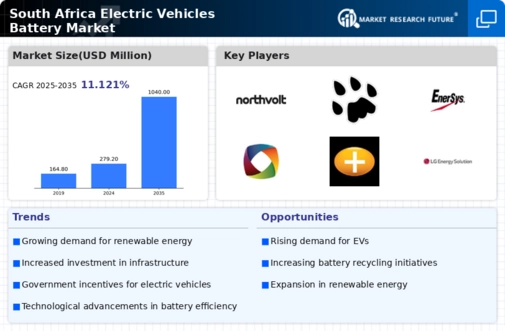Rising Fuel Prices
The escalating fuel prices in South Africa are driving consumers to consider alternative transportation options, including electric vehicles. As petrol and diesel prices continue to rise, the electric vehicles-battery market is likely to experience increased demand. The cost of fuel has seen a significant increase, with prices reaching approximately R20 per liter. This economic pressure encourages consumers to invest in electric vehicles, which offer lower operational costs. The electric vehicles-battery market is thus positioned to benefit from this shift, as consumers seek to reduce their reliance on fossil fuels. Furthermore, the long-term savings associated with electric vehicles, including lower maintenance and charging costs, may further incentivize adoption. As fuel prices remain volatile, the trend towards electric vehicles is expected to strengthen, potentially leading to a more robust electric vehicles-battery market in South Africa.
Environmental Regulations
The implementation of stringent environmental regulations in South Africa is propelling the electric vehicles-battery market forward. The government has set ambitious targets to reduce greenhouse gas emissions, aiming for a 34% reduction by 2025. These regulations are encouraging manufacturers to invest in electric vehicle technology and battery production. As a result, the electric vehicles-battery market is likely to see an influx of new models that comply with these environmental standards. Furthermore, the push for cleaner transportation options aligns with global trends towards sustainability, making electric vehicles more attractive to environmentally conscious consumers. The regulatory framework is expected to create a favorable environment for the electric vehicles-battery market, fostering innovation and growth in the sector.
Technological Innovations
Technological advancements in battery technology are significantly influencing the electric vehicles-battery market. Innovations such as solid-state batteries and improved lithium-ion technologies are enhancing the performance and efficiency of electric vehicles. These advancements are likely to lead to longer driving ranges and shorter charging times, addressing some of the key concerns of potential electric vehicle buyers. In South Africa, local manufacturers are beginning to invest in research and development to create more efficient battery solutions. The electric vehicles-battery market stands to benefit from these innovations, as they may result in lower production costs and improved vehicle performance. As technology continues to evolve, the electric vehicles-battery market is expected to attract a broader consumer base, further driving growth in the sector.
Consumer Financing Options
The availability of diverse financing options for electric vehicles is emerging as a significant driver for the electric vehicles-battery market. Financial institutions in South Africa are increasingly offering tailored loan products and leasing options specifically for electric vehicles. This trend is likely to make electric vehicles more accessible to a wider audience, as upfront costs can be a barrier to entry. With financing solutions that include lower interest rates and longer repayment terms, consumers may find it easier to invest in electric vehicles. The electric vehicles-battery market is thus poised to benefit from this shift, as more individuals are encouraged to transition from traditional vehicles to electric alternatives. As financing options continue to expand, the potential for market growth appears promising.
Infrastructure Development
The expansion of charging infrastructure across South Africa is a crucial driver for the electric vehicles-battery market. As more charging stations become available, the convenience of owning an electric vehicle increases, thereby attracting more consumers. Recent government initiatives have focused on enhancing the electric vehicle charging network, with plans to install over 1,000 charging points by 2026. This development is likely to alleviate range anxiety among potential electric vehicle buyers, making the electric vehicles-battery market more appealing. Additionally, partnerships between private companies and local governments are emerging to facilitate the establishment of charging stations in urban and rural areas. The growth of this infrastructure is expected to support the electric vehicles-battery market by providing the necessary facilities for electric vehicle users, ultimately leading to increased adoption rates.

















